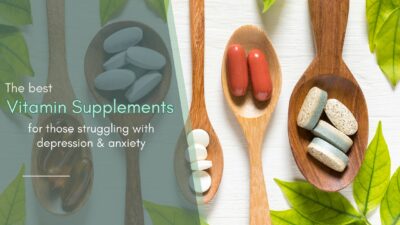
It’s true. Food really is medicine when it comes to treating symptoms of depression and anxiety. But only when that food nurtures your brain and body with the vitamins and minerals they need. And let’s be honest, much of our Standard American Diet (aka SAD) cuisine just doesn’t cut it. SAD foods lack the nutrients that can help a person heal from depression and anxiety. That’s why vitamin and mineral supplements for mental health have taken on such an essential role in treating mood disorders.
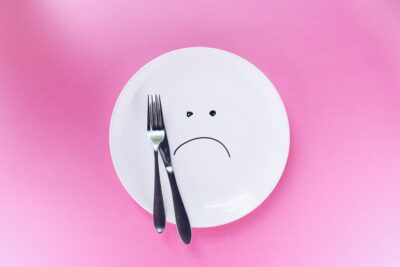
Standard American Diet foods lack the nutrients that can help a person heal from depression and anxiety.
Why you might need vitamin supplements for mental health
Your brain’s health plays a starring role in both the development and healing of depression and anxiety. You need a healthy brain to reap the rewards of good mental health. And the brain only thrives with a healthy supply of certain vitamins and minerals.
Wondering why the foods you eat might not provide your brain with the vitamins and minerals it needs to fend off depression and anxiety?
Well, there are several answers to that question:
- A junk food epidemic has plagued us for decades. Yep. As mentioned above, much of our SAD cuisine lacks any real nutritional value, including the best minerals and vitamins for mental health. And this junk food is addictive. We can’t help but eat it. So, we’re both overfed and undernourished.

A junk food epidemic has plagued the United States for decades, so we’re not getting the necessary minerals and vitamins for mental health.
In her book The Mood Cure, Nutritional Therapist Julia Ross says: “This is the scary truth about malnutrition: When your food quality deteriorates, your mood is the first casualty, even before your physical health begins to deteriorate.” And I understand that some people can consume the Standard American Diet without developing depression and anxiety. But those of us genetically predisposed or exposed to environmental factors that trigger depression and anxiety simply can’t thrive on the nutrient deficient SAD diet full of carbs, refined sugars, and unhealthy fats. And that’s where mental health supplements can step in to fill a need.
- Some people have genetic variants that make it difficult to absorb certain nutrients. The human body is a complex mass of genetic material. And little glitches in this system are common. For example, some of us have genetic variants that make it difficult to absorb folate, which is an essential vitamin for mental health. So, even a person eating healthy foods and limiting SAD junk may not get enough of the best vitamins for anxiety and depression.
- Stress messes with your ability to absorb and store nutrients. Stress plays a starring role in the development of depression and anxiety. There are many reasons for this. But for one, it interferes with your ability to absorb and maintain optimal nutrient levels. And I don’t’ think most people realize that.

Stress plays a starring role in the development of depression and anxiety.
- According to Julia Ross, your stores of the vitamins and minerals that fend off depression drop 30 to 40 percent after just one stress-filled week. And a stressed-out person’s adrenal glands use up around 90% of their Vitamin C intake. And C is an essential vitamin for mental health. Your adrenal glands also need a consistent rich supply of B vitamins. And when stressed, you may have a hard time getting enough of these.
- Processing strips nutritional value from the foods we eat. Again, ultra-processed foods are a staple of the Standard American Diet.

Ultra-processed foods have been stripped of the best vitamins for mental health.
- The agriculture industry has depleted our soil of vital nutrients. Nowadays, even unprocessed foods like fruits and vegetables don’t always contain the vitamins and minerals they should. That’s because the soil used to grow these foods no longer contains the nutrients it needs to pass along to its crops.

The agriculture industry has depleted our soil of the nutrients it needs to pass along to crops.
So, what are the top mood cure supplements recommended by nutritionists?
Are you know thinking about taking vitamin supplements for better mental health? I can’t say I blame you!
But just a word of caution: do your research before you buy! Because the Food and Drug Administration (FDA) doesn’t regulate the vitamin industry. And there really are some seedy companies out there making false claims about their products. To play it safe, try and find supplements for mental health that are endorsed by the:
- United States Pharmacopeia (USP) organization, which provides a list of verified supplements.
- National Sanitation Foundation (NSF), which provides a list of NSF-certified supplements.
- Natural Products Association (NPA), which issues the NPA GMP (Good Manufacturing Practices) certification.
Secondly, always check with your doctor before taking any supplements. For one thing, some vitamin supplements for mental health can interact with certain medications. Then after you get the go-ahead, start by taking lower doses of vitamins for stress, depression, and anxiety to see how well you tolerate them. You can always increase the dose from there.
Finally, make sure you’re buying mental health supplements that actually work. If you want a multivitamin for treating symptoms of depression and anxiety, look for one that includes B, C, and D vitamins. Here’s an explanation as to why you need these. (I’m going to give you this one in alphabetical order 😊.)
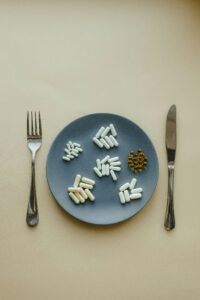
You can take vitamin supplements for mental health to make up for the lack of nutrients in foods you eat.
Vitamin supplements for mental health
The best vitamins for depression and anxiety include:
B Vitamins. There are so, so many reasons you need your Bs for mental health. It’s almost hard to know where to begin on this one. But here goes
- First, you need B vitamins to produce the neurotransmitters like serotonin and dopamine that are essential for mood regulation. B12, B6, and B9 or folate take the lead in this production process, so they’re especially important vitamins for depression and anxiety.
- Secondly, you need B vitamins to metabolize sugar!!!!! A whole slew of health conditions stem from unbalanced blood sugar, including depression and anxiety.
- Finally, B vitamins reduce oxidative stress to the brain. And oxidative stress contributes to the development of depression and anxiety.
So, as you can see, getting your Bs is really stinking important when you’re trying to prevent or heal from depression and anxiety.
Here’s a more complete list of the best B vitamin supplements for mental health:
- B1, aka thiamine. Vitamin B1 deficiencies can trigger depression and anxiety. Specifically, you need Vitamin B1 because your brain uses it to convert glucose or blood sugar into energy. This process helps balance your blood sugar. And again, unbalanced blood sugar is associated with depression and anxiety. B1 also strengthens the nervous system, giving it the ability to combat stress. People who can cope with stress are less prone to depression and anxiety. You can also get B1 through your diet by eating salmon, sunflower seeds, oatmeal, peas, lentils, yogurt, and eggs – to name a few.
- B2, aka riboflavin. Research has linked B2 deficiency to depression. This is another vitamin for mental health that supports the production of stress regulating hormones from the adrenal glands. You can also get B2 by eating eggs, milk, mushrooms, almonds, spinach, yogurt, avocados, salmon, cheese, and chicken.
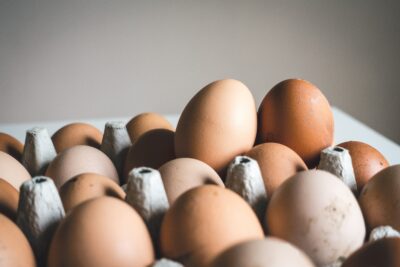
Eggs are full of B1 and B2 – two of the best vitamins for mental health.
- B3, aka niacin. This vitamin for mental health supports the nervous system and boosts brain function. And (you guessed it!), a B3 deficiency may cause depression and anxiety. Symptoms of B3 deficiency are pretty much one and the same as the symptoms of depression and anxiety. These include fatigue, depressed mood, insomnia, nervousness, and apprehension. You can also get B3 from foods like chicken, turkey, brown rice, peanuts, and potatoes. Of special note: Don’t eat more than 14 mg of B3 a day if you’re a woman or more than 16 mg a day if you’re a man. In excessive quantities, B3 can be dangerous and cause allergic type reactions such as red and itchy skin.
- B6, aka pyridoxine. The body needs B6 to convert tryptophan into serotonin and tyrosine into norepinephrine. And I’m sorry about all the science-y words here. But basically, the body can’t make certain neurotransmitters without vitamin B6. Spinach, potatoes, sweet potatoes, chickpeas, raisins, sunflower seeds, and bananas are all high in vitamin B6. Of special note: Don’t overdo B6 supplementation, as it can have toxic effects on the nervous system. You should not have more than 100 mg of B6 a day.
- B7, aka biotin. Higher biotin intake is linked to lower incidence of depression and anxiety. Biotin is another one that helps regulate blood sugar. And again, unbalanced blood sugar may cause depression. In addition to vitamin supplements for mental health, peas, lentils, sunflower seeds, carrots, cauliflower, mushrooms, eggs, dairy products, seafood, and whole grains are all great sources of biotin.

Carrots are full of biotin, another one of the best vitamins for mental health.
- B9, aka folate. This vitamin for mental health regulates your levels of neurotransmitters such as serotonin and dopamine. Low folate levels elevate your risk of developing depression and diminish the potentially positive effects of antidepressant medication. It’s easy to get enough folate in your diet. But some people have genetic irregularities that decrease their ability to process and absorb folate. And these people are more prone to developing depression. Fortified cereals, avocado, beans, asparagus, eggs, bananas, and spinach are all excellent sources of folate.
- B12, aka cobalamin. Surprise, surprise! This vitamin for mental health also plays a role in serotonin production. And B12 deficiency triggers depression and anxiety. Many symptoms of B12 deficiency are the very same as symptoms of depression. Studies indicate that a 1 milligram daily supplement of B12 may help treat depression. Of special note: Vegetarians and vegans are more likely to develop a B12 deficiency because animal products are the best sources of this vitamin. So, if you’re vegetarian or vegan, you really should take a Vitamin B12 supplement as long as your doctor approves.
Vitamin C. The highest concentrations of this vitamin in a person’s body are found in the brain. And according to the Mayo Clinic, people deficient in Vitamin C often experience fatigue and depression. Research links Vitamin C supplementation with improved mood in people with depression and lower levels of self-reported anxiety.
The reason?
Just like Vitamin B6, this vitamin for mental health helps convert tyrosine into dopamine and tryptophan into serotonin. It also plays a role in the production of GABA, norepinephrine, and epinephrine. And Vitamin C helps regulate cortisol levels. All these neurochemicals and hormones help improve a person’s stress response. And low levels of these neurochemicals have been linked to the development of depression and anxiety.
But that’s not all.
Vitamin C is also an antioxidant. And oxidative stress plays a role in the development of depression. So, Vitamin C intake may not only improve symptoms of depression and anxiety but also help prevent these symptoms from developing in the first place. I think you get the idea 😊 Of special note: Don’t overdo the C! Too much can cause diarrhea, nausea, vomiting, heartburn, stomach cramps, and headaches. The upper limit for Vitamin C for adults is 2000 mg a day.
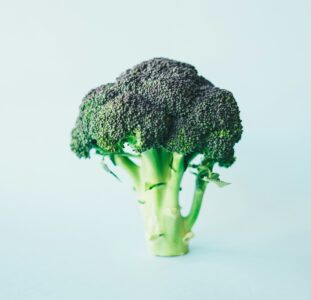
Broccoli is an excellent source of Vitamin C, another one of the best vitamins for mental health.
Vitamin D. Research has linked low Vitamin D levels to depression and anxiety. It’s unclear if Vitamin D deficiency causes depression or if depressed people are more at risk for this deficiency. Some theorize that depressed people spend less time outdoors, and sunligh.t is the best source of this vitamin for mental health. Regardless, people with depression often have low levels of D in their systems. And Vitamin D supplementation can help alleviate symptoms of both depression and anxiety.
Of special note: Don’t overdo the Vitamin D, as too much can cause nausea, vomiting, poor appetite, weight loss, constipation, weakness, confusion, heart rhythm problems, kidney stones, and kidney damage. Specifically, don’t take more than 4,000 IUs a day.

Sunlight is the best source of Vitamin D, another essential vitamin for mental health.
So, those are the best vitamins for depression and anxiety. But the body relies on a few minerals as well for better mental health. That said, supplements for mental health should include as few minerals as well.
Mineral supplements for mental health
The best mineral supplements for mental health include:
- Calcium. I’m guessing you’ve heard that calcium keeps your bones strong. But it has many other functions in the body as well, some of which – you guessed it – relate to mental health. So, calcium is a good one to include in supplements for mental health. Because calcium regulates the central nervous system and controls excitatory brain activity. Without enough calcium, your central nervous system can go haywire and prompt the development of depression and anxiety.
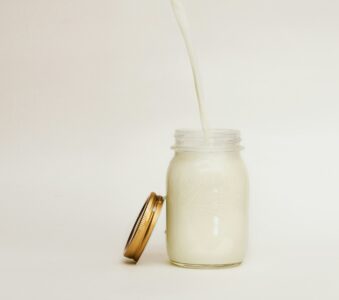
Milk is an excellent source of calcium, which is one of the best minerals for mental health.
- Magnesium. As much as 68% of Americans don’t get enough magnesium. And research suggests that magnesium may help improve symptoms of depression. So, it goes without saying that magnesium is another star player in the beset supplements for mental health. But why is magnesium so important? For one thing, it regulates blood sugar. For another, it improves sleep quality. Both stable blood sugar and high-quality sleep can prevent and help you heal from depression and anxiety.
- Zinc. Studies show that people with low amounts of zinc in their blood are more prone to depression. In fact, the lower the zinc levels, the more severe the depression. The reason? Certain proteins that regulate neurotransmitters need zinc to do their job. Zinc also decreases inflammation, which may trigger depression and anxiety. So, this is another mineral to include in supplements for mental health.
And you really must get the go-ahead from your doctor before trying this supplement for mental health
Before wrapping up, I’d like to say a little bit about iron. It’s another mineral that plays a role in mental health, and it could be messing with yours. But before I explain, I just want to note that you really should not take an iron supplement unless your doctor has confirmed you’re deficient in this mineral. It can cause some real issues if you take this one without your doctor’s consent.

Always ask your doctor before taking any supplements for mental health, especially iron supplements.
But yep, studies show that iron deficiencies often go hand-in-hand with depression. Iron deficiency symptoms include general weakness, listlessness, exhaustion, lack of appetite, and headaches. Sound familiar? Welp, that’s because these are some of the same symptoms of depression.
Iron helps oxygen circulate throughout the body. And guess what, it also supports production of serotonin, dopamine, and epinephrine. So, iron supplementation has been known to improve symptoms of depression and anxiety.
But again, I didn’t want to list this one as a top mood cure supplement recommended by nutritionists without noting that you shouldn’t take an iron supplement knowing that you have low blood iron levels and getting the go-ahead from your doctor.
One more note about minerals as supplements for mental health
Now that we’ve talked about the minerals you need, I want to point out that you should take extra caution when taking mineral supplements. Because minerals aren’t water soluble like B vitamins and Vitamin C. And you could reach toxic levels if you accumulate too much in your body.
That’s a wrap on mood cure supplements recommended by nutritionists
Before signing off, I’d like to give one more reminder that you should always consult with your primary care provider before taking supplements of any kind. (I know, I know.. but it really is important!) Over the counter (OTC) supplements can have side effects and interact with certain medications.
And too, don’t forget to look for multivitamins for depression and anxiety that have the following seals of approval:
- United States Pharmacopeia (USP).
- National Sanitation Foundation (NSF).
- Natural Products Association (NPA).
Supplements with these seals of approval have gone through extra testing to confirm that they’re free of contaminants and really do contain the ingredients listed on their labels.
And that’s a wrap for now! But if you’d like to learn more about treating depression and anxiety with integrative nutritional therapy, please pay a visit to other blogs on annedeleeuw.com. See you there!


